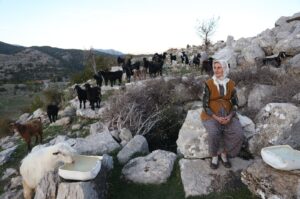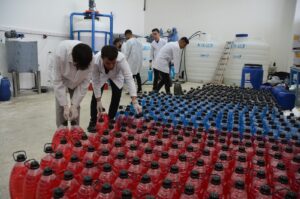Türkiye’s Environment, Urbanization and Climate Change Ministry has released a detailed overview of the country’s first Climate Bill, which is expected to be discussed soon in the Grand National Assembly (TBMM). The proposed legislation aims to formally anchor Türkiye’s climate efforts in law and create a framework for sustainable development in the face of the global climate crisis.
The bill includes 20 main articles, two provisional clauses and proposed changes to three existing laws. If passed, it will legally establish strategies to reduce the impact of climate-induced disasters, promote clean energy, preserve biodiversity and green spaces, and strengthen food and water security across the country.
A major component of the law focuses on developing climate-resilient cities, encouraging nature-friendly production models through renewable energy, and preparing both local and national action plans to protect key sectors like agriculture, food and urban infrastructure.
To reduce economic and human losses from climate-related disasters, the bill proposes an integrated disaster management system, incorporating risk assessments, early warning systems and real-time monitoring. It also aims to enhance the international competitiveness of various industries by legally supporting environmentally sustainable production.
The law is designed to support Türkiye’s 2053 Net Zero Emissions Target and promote a Green Growth strategy. It aims to mitigate the adverse impacts of climate-related crises and disasters by making cities more climate-resilient and reducing environmental risks.
The proposed law covers various sectors, including cities, infrastructure, agriculture, animal husbandry, water resources and green areas. It also targets energy, industry and transportation sectors by encouraging the transition to environmentally friendly technologies, making the economy and society more resilient to climate-related challenges.
Each province will establish a Provincial Climate Change Coordination Board under the governor’s leadership, involving relevant institutions and local governments. These boards will prepare localized action plans tailored to each province’s unique conditions. Institutions are required to complete their strategies and plans aligned with national climate policies by Dec. 31, 2027.
To reduce the damage and losses caused by climate-induced disasters, the law proposes the development of integrated disaster management systems, including risk assessments, monitoring, public awareness campaigns and early warning systems.
The law outlines steps for managing water resources more efficiently and protecting forests, wetlands, pastures and farmlands. It also promotes the expansion and enhancement of protected terrestrial and marine areas. National-level rehabilitation projects will be planned to combat drought, erosion and land degradation.
To accelerate green innovation, the law encourages the development and wider use of clean technologies such as hydrogen energy. This will involve strengthened cooperation between the public sector, private companies and research institutions.
The ministry plans to implement education and awareness programs to help the public understand the impacts of climate change. Curricula across all educational levels will be updated, and efforts will be made to train a green workforce, with coordination from the Ministry of Education and the Higher Education Council.
The Türkiye Green Taxonomy will help identify whether an investment is environmentally sustainable and climate-friendly. This will not only guide domestic investments but also enhance Türkiye’s access to international green finance.
Türkiye will implement its first Emissions Trading System, which will enable cost-effective reduction of greenhouse gas emissions. Over time, this system will help industries become more efficient, cleaner and globally competitive under the Green Transformation agenda.
The proposed climate law in Türkiye is a comprehensive legal framework that goes far beyond just emissions trading. While the Emissions Trading System (ETS) is a central component designed to reduce greenhouse gas emissions in a cost-effective way, the law encompasses a wide range of strategies aimed at building climate-resilient cities, ensuring long-term water and food security, expanding the reach of the zero waste initiative, increasing the use of clean energy and new technologies, and safeguarding biodiversity and agricultural land.
Contrary to some public speculation, the law does not seek to eliminate farming or replace natural food sources with synthetic alternatives. The ministry has firmly rejected such claims, emphasizing that the legislation supports organic farming and animal husbandry as key pillars of national food security. There is no mention of lab-grown food or insect-based diets in the law, and such assertions are considered baseless and misleading.
The law also does not introduce any carbon tax for individual citizens. It contains no provisions that would require people to pay taxes based on their personal emissions or lifestyle choices. The regulation focuses instead on institutional responsibilities, particularly targeting sectors like industry and energy production.
Similarly, while the law encourages a transition to cleaner and more sustainable energy sources, it does not call for an outright ban on coal or oil. The transition away from fossil fuels will be handled in a balanced manner that aligns with Türkiye’s economic development goals and aims to maintain social welfare. Rather than abrupt prohibitions, the legislation supports a gradual and strategic shift toward greener alternatives.
In line with global environmental goals, the law introduces a carbon footprint framework specifically targeting institutions and producers. This initiative aims to reduce the environmental impact of manufacturing by mandating the use of cleaner, more energy-efficient technologies. Importantly, these requirements do not extend to individual citizens. Instead, the focus is on minimizing industrial emissions during the production process, preserving natural resources and promoting sustainable practices within the manufacturing sector.




















































Be First to Comment